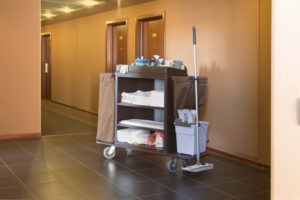
By: Lizz Chambers
How many of us get up in the morning absolutely on-fire looking forward to another day at work? While this may be something more often obtained by those in senior positions, in the case of housekeepers the world over, it’s, “Yes, another glorious day at work cleaning up after our hotel guests!”
Although we love each and every one of our guests, some are not the personification of cleanliness and order. Another beautiful day scrubbing toilets and feeling that the rest of the staff somehow looks at us differently because of the menial tasks we perform. Yes, these are the menial tasks that enable our hotels to fill rooms, make raving fans of our guests, promote repeat business, protect our hotel’s assets and up that profit margin. If you define that as menial you and I are using different dictionaries.
Our housekeepers and every member of our hotel staff still need more answers to the very important personal question, “What’s in it for me?” This is not a cynical question. It is just another way of asking, “How much am I worth?” As an owner or manager, we should all ask ourselves this same question. Why should we be surprised or, worse yet, offended when our associates ask this same question of us?
We must always remember that our staff members have heartfelt needs, feelings and ideas. If we are going to be successful we must nurture those needs. If nurtured properly we can create an energy that can be used for our associates’ good and for ours. How do we create an environment to nurture and then harness the energy it will ultimately produce? How do we motivate these crucial people who take care of our guests and our tangible assets day-after-day?
More to the point, how do we motivate the ‘Heart of the Hotel’ – that is, our housekeepers? Here are a few evergreen suggestions to start off with, although your personal success will depend on your individual answers and on what you choose to implement:
1. Communicate. Successful hotel managers and supervisors build good attitudes by keeping associates well informed of business affairs.
Example: Meetings are one of the best forms of management-associate communication. Holding regular meetings is one of the best means of motivating your staff and building self-esteem. If you have a Spanish speaking staff and you are not fluent then hire an interpreter once a month – it is worth the expense. The housekeeping supervisor can write up the minutes and distribute them to all concerned.
Hotel Executive Committee meetings are usually held for supervisors and department heads. Have you ever invited a room attendant, laundry worker, house person or any other hotel associate to attend this meeting once a month or perhaps once each quarter? This can make each person on your staff feel important to the success of the hotel. The associate recognizes their value and sees how their efforts help create success.
2. Ask for and implement THEIR ideas. To feel very much a part of the hotel team, each associate must understand that they are free to contribute ideas. Management must encourage associate ideas and provide the necessary method for obtaining them. Suggestion boxes and brainstorming sessions are a couple of possibilities. As the manager, you must carefully consider all ideas and, if adopted, reward the contributor. If not adopted, you must give a word of explanation as well as due appreciation for the effort.
Example: Suppose you need a method for folding the new ‘massive’ bed linen supply so it cannot only be stored in the supply room, but also that it can fit properly on a housekeeping cart that has not changed size since the 50s. Many hotels are facing this challenge with Marriott, Holiday Inn Express and several other franchises changing the bed linen requirements. To approach this issue, start by asking the people who work with this dilemma every day. You will find that you have instilled in their minds an appreciation for your thoughtfulness in seeking their ideas about the problem. I will wager that their ideas may be much more user-friendly than yours because you do not work with this challenge on a daily basis.
3. Show that you care. Each morning, take a walk back to the housekeeping department and talk to the staff as they prepare for work. (Then move on to the kitchen, front desk, maintenance and so forth.) In this sense, actions speak louder than words, and your simple, thoughtful action of regularly visiting them will do wonders. Another excellent way to create motivation is a personal meeting over lunch or breakfast with each associate.
Example: Managers should find time at least once each year, or with a smaller staff once a quarter, to sit down in private with each associate over breakfast or lunch. (And not just housekeeping either!) In this setting, you can discuss both business and personal matters in a friendly manner. These talks smooth out problems and difficulties which may be blocking the motivation of an associate. The talks are also helpful to you as you may receive information which may not have come to you in any other way.
Since much personal motivation is derived from a competent and caring manager, your efforts to improve the quality of the housekeeper’s working environment will reflect directly in higher motivation, achievement and morale. As one last suggestion, please lose the term ‘maid’; it went out with the 60s.
Originally published in eHotelier on March 3, 2016.


Leave a Comment